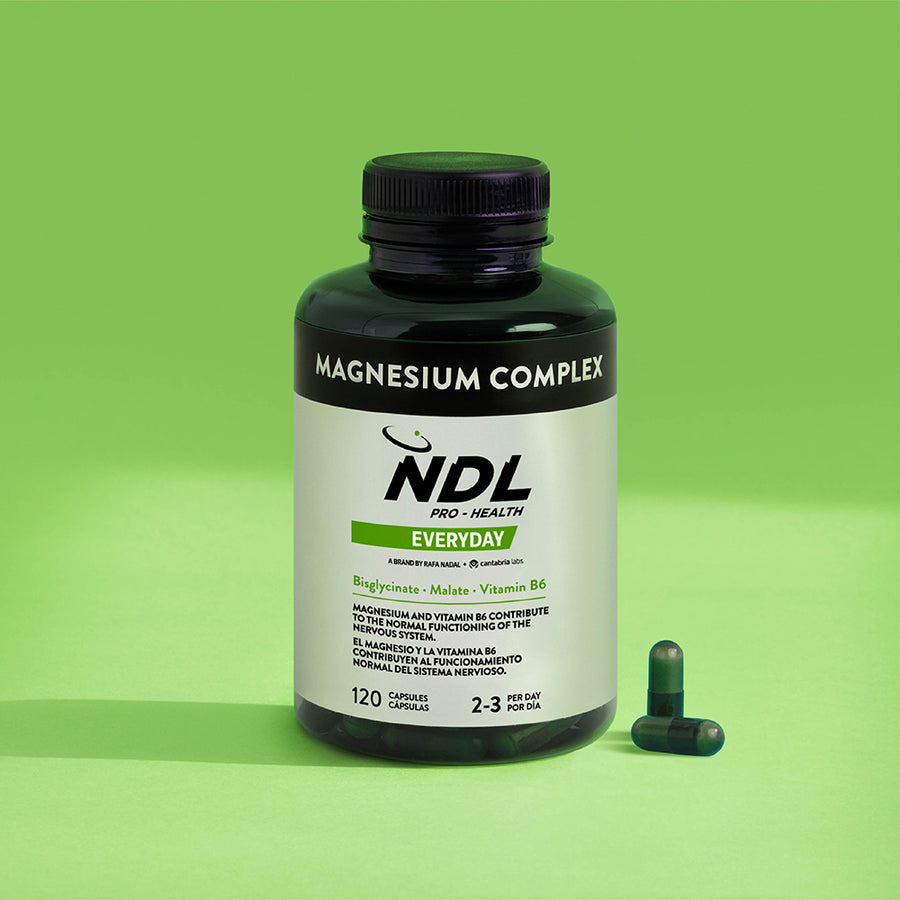Featured Products

Triple Magnesium
See productMuscle cramps are a common discomfort that can interrupt our activities and affect physical performance.
Although there are several causes, in this post we’ll talk about the benefits of magnesium for muscle cramps—a mineral that plays a key role in preventing and relieving these painful contractions.
What are muscle cramps?
Muscle cramps are involuntary and painful contractions of muscles that can occur suddenly. Although they usually last only a few seconds or minutes, their intensity can be enough to stop movement and cause significant discomfort.
These contractions are common in both active individuals and those with more sedentary lifestyles, and they tend to occur most frequently in the legs, especially at night or after intense physical exertion.
Causes of muscle cramps may vary, but are often linked to dehydration or an imbalance of key electrolytes like magnesium, potassium, and calcium. When the body doesn’t have enough of these minerals, muscles may struggle to relax after contracting, leading to spasms. Overexertion, muscle fatigue, and holding static positions for long periods can also trigger them.
Preventing cramps involves staying well-hydrated and maintaining a balanced diet that includes foods rich in essential minerals. Adding regular stretching—especially before and after physical activity—can also help keep muscles relaxed and flexible.
For frequent or intense cramps, taking magnesium supplements can be an effective solution to support muscle function and avoid recurring discomfort.
While muscle cramps are usually harmless, they can impact quality of life and physical performance. Identifying the causes and taking preventive measures can make a big difference.

The role of magnesium in the body
Magnesium is an essential mineral involved in over 300 processes in the body, crucial for muscle, nerve, and energy health. Its main function in muscles is to regulate contraction and relaxation by balancing calcium and potassium within cells. When magnesium levels are low, muscles may cramp and spasm due to an inability to properly relax.
Additionally, magnesium is vital for nerve signal transmission, protein synthesis, bone strength, and energy production. A deficiency can lead to fatigue, muscle weakness, and poor post-exercise recovery. Eating magnesium-rich foods or using supplements is key to keeping the body healthy and active.
Benefits of magnesium for muscle cramps
As mentioned, magnesium is essential for proper muscle function, and its role in preventing and relieving cramps is widely recognized.
Here’s why magnesium helps with cramps:
1. Muscle relaxation: Magnesium helps regulate calcium and potassium balance in muscle cells. While calcium promotes contraction, magnesium allows relaxation. Without adequate magnesium, muscles may stay contracted, causing cramps and spasms.
2. Prevention of electrolyte imbalances: During exercise or intense sweating, the body loses essential minerals, including magnesium. Replenishing it helps maintain electrolyte balance and prevents exercise-induced cramps.
3. Improved muscle recovery: Magnesium reduces muscle tension and supports recovery after physical activity, helping prevent nighttime or post-exercise cramps.
4. Reduced muscle fatigue: As a key player in energy production, magnesium helps prevent fatigue that can worsen cramps. It keeps muscles working efficiently during exertion.
5. Support during high-demand periods: Pregnant women and older adults—more prone to cramps—can benefit from magnesium to ease discomfort and prevent recurring spasms.
Therefore, magnesium is an effective and natural solution for preventing and relieving muscle cramps, especially when combined with hydration and regular stretching. If cramps are frequent, eating magnesium-rich foods or using high-quality supplements can make a big difference in muscle and overall well-being.
Sources of magnesium
The main sources of magnesium to include in your daily routine are:
- Dietary sources: Consuming magnesium-rich foods is the most natural way to ensure proper intake. Top sources include:
• Nuts and seeds: almonds, walnuts, cashews, pumpkin seeds, and sunflower seeds.
• Legumes: lentils, chickpeas, beans, and soy.
• Leafy green vegetables: spinach, Swiss chard, kale, and broccoli.
• Whole grains: brown rice, oats, quinoa, and whole wheat.
• Fruits: bananas, avocados, figs, and dried fruits like raisins.
• Fatty fish: mackerel, salmon, and tuna.
• Dark chocolate: with high cocoa content (at least 70%).
- Magnesium supplements: When dietary intake isn’t enough, supplements are an excellent alternative. Available in tablets, capsules, powders, or liquids, they are especially helpful for athletes, pregnant women, or those with diagnosed deficiencies.
- Magnesium-rich water: Some mineral waters naturally contain magnesium and can contribute to your daily intake.
A diet rich in natural foods and supplement use when needed are key to ensuring optimal magnesium levels.
Tips for effective recovery
Recovery is essential for muscle care and physical performance. Adopting the right habits can help prevent discomfort like cramps and maximize results. Here are some key tips for effective recovery:
- Stay hydrated: Water is essential to replace fluids lost during exercise. Proper hydration helps maintain electrolyte balance—especially magnesium and potassium—crucial for muscle function. If you train intensely, consider natural isotonic drinks.
- Consume essential nutrients: After exercise, prioritize foods rich in magnesium, protein, and carbohydrates to repair muscles and restore energy. Smoothies with nuts, banana, and spinach are ideal to replenish key nutrients.
- Stretch and relax muscles: Perform light stretches after activity to relieve muscle tension and improve circulation. Add relaxation techniques like yoga or foam rolling to release tightness.
- Get enough rest: Sleep is vital for recovery. During sleep, the body repairs tissues and strengthens muscles. Aim for 7 to 9 hours per night for full recovery.
- Consider appropriate supplements: Magnesium supplements can help prevent cramps and speed up muscle recovery.
- Listen to your body: Pay attention to your body’s signals. If you feel intense or persistent pain, reduce workout intensity and consult a specialist.
Effective recovery requires a comprehensive approach combining hydration, nutrition, rest, and muscle care. By adopting these habits, you’ll not only improve your performance but also reduce the risk of injury and recurring discomfort.
In conclusion, magnesium for cramps is a key ally for both prevention and relief, thanks to its role in muscle relaxation, electrolyte balance, and physical recovery. Maintaining a magnesium-rich diet, supported by hydration and healthy habits, can make a real difference in your muscle well-being.

From the NDL Pro-Health team we will provide you with tips to maintain a healthy lifestyle. Sharing knowledge and product recommendations to offer optimal solutions for your daily routine, for your workouts and subsequent recovery, all with the goal of helping you achieve physical and mental wellness.

















